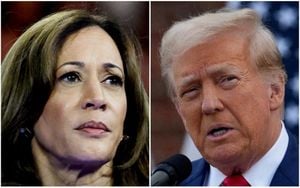President-Elect Donald Trump’s nomination of Brendan Carr to chair the Federal Communications Commission (FCC) has stirred significant debate over the future of telecommunications and internet regulations. With Carr's track record and specific plans outlined for the agency, many observers are left questioning the ramifications this appointment could have on broadband access, net neutrality, and online speech policies.
Carr, who has been part of the FCC since 2017, previously served as general counsel and has been vocal about transforming the agency’s role. Following his nomination announcement by Trump, Carr expressed his ambition to "dismantle the censorship cartel and restore free speech rights for everyday Americans." This aligns closely with Trump’s proclamation of Carr as "a warrior for free speech" during the announcement, framing him as someone ready to challenge the existing regulatory norms.
The significance of this pick goes beyond Carr's rhetoric. His leadership is expected to shift focus to the controversial subject of online speech regulation—a domain the FCC has historically tiptoed around. According to Carr’s chapter within the Project 2025 initiative, which lays out strategic plans for Trump's potential second term, he aims to target "Big Tech" and intends to re-evaluate how Section 230 of the Communications Decency Act is applied to social media companies. Section 230 grants legal immunity to platforms for content posted by users, allowing them to regulate content without legal repercussions. Carr believes this provision offers too broad immunity, and as chair, he would seek to modify this aspect, potentially making social platforms liable for user-generated content.
Analysts have raised concerns about the practicalities of his proposed changes. Experts like Chris Lewis from Public Knowledge argue there is no legal basis for the FCC to enforce such measures, labeling Carr's ambitions as "radical" and not grounded in law. Legislative attempts at reshaping Section 230 would require congressional approval, which may pose significant barriers.
While Carr’s potential changes could reshape internet governance, the impact on broadband access—particularly for underserved communities—is also under scrutiny. Advocates for digital equity, such as Shayna Englin from the California Community Foundation, warn this could have dire consequences for internet access across California. Under the Trump administration, FCC policies may steer federal funds away from urban areas, disproportionately affecting the vast majority of Californians, and potentially rehashing prior debates surrounding the equitable distribution of broadband funding.
Advocates are particularly worried about Trump's intent to eliminate existing diversity, equity, and inclusion initiatives established by the Biden FCC. These policies aimed to address disparities and provide equitable access to high-speed internet, especially for marginalized communities. Englin stresses the urgency for California legislators to act decisively to protect their residents from prospective federal rollbacks.
The renewed focus on net neutrality—a principle ensuring all internet traffic is treated equally—also hangs in the balance. Previous attempts under the Trump administration to dismantle net neutrality regulations faced legal opposition, and with Carr at the helm, the FCC may make fresh attempts to reverse or weaken these protections.
On the other hand, Carr's close ties with figures like Elon Musk have sparked speculation about favoritism toward burgeoning companies like SpaceX. Under Carr's direction, it is believed there could be more favorable conditions for entities pushing the boundaries of traditional telecommunications, potentially heralding increased competition among satellite internet providers. Carr's views on regulatory frameworks might indicate he sees potential for innovation and expansion—albeit with considerable risks to existing norms governing competition and media oversight.
Additional controversies loom around Carr’s proposed free speech regulations. Critics assert these might mask political goals under the guise of championing free expression. For example, Carr has hinted at launching inquiries against media outlets, reflecting Trump's antagonistic view of press coverage. His remarks targeting NBC's broadcasting license over perceived violations of media regulations suggest he could use this power to exert pressure on companies producing unfavorable content.
On platforms like X (formerly Twitter), Carr's activity has indicated his agenda related to 'cleaning up' the internet by advocating for stringent measures against harmful content—a stance some view as contradictory to his professed support for free speech.
With the FCC's current majority being Republican, Carr's chairmanship could shift the balance toward more conservative policies surrounding media ownership and control, diverging from efforts focused on safeguarding the public interest. The tension between regulation and free speech stands at the forefront, prompting questions about the agency's role: Will it serve as the public’s champion or transform itself under Carr’s leadership?
Looking back at Trump’s past executive orders targeting internet governance, it’s clear there was already momentum toward exerting FCC oversight over the web. Such directives faced significant pushback, but the composition of Congress and the courts plays a pivotal role in the agency's capability to implement major policy changes. Without clear legislative authority, Carr's ambitions may face substantial legal hurdles.
Yet amid this uncertainty, industry stakeholders brace for changes with far-reaching effects on their businesses. Following Carr’s confirmation, companies, especially those reliant on federal contracts or subsidies, could find themselves at the mercy of the FCC’s shifting priorities.
The path forward for Carr will be determined not just by his initiatives but also through the lenses of public reception, legislative cooperation, and impending legal challenges. Broadband access, speech regulation, and equity will intersect as Carr navigates the political and regulatory waters of his new role. The stakes are high, and communities across the nation are watching intently.



